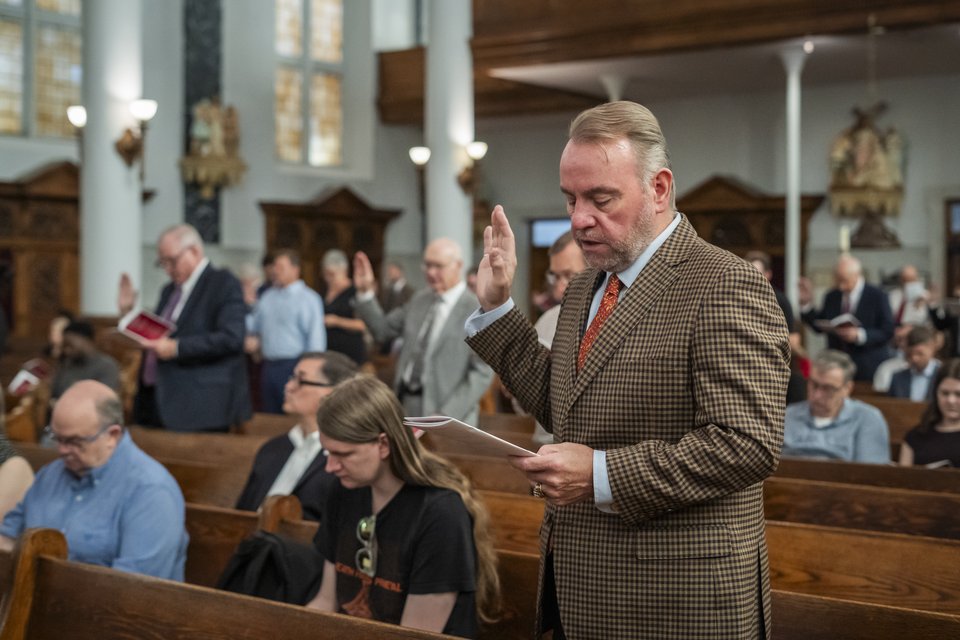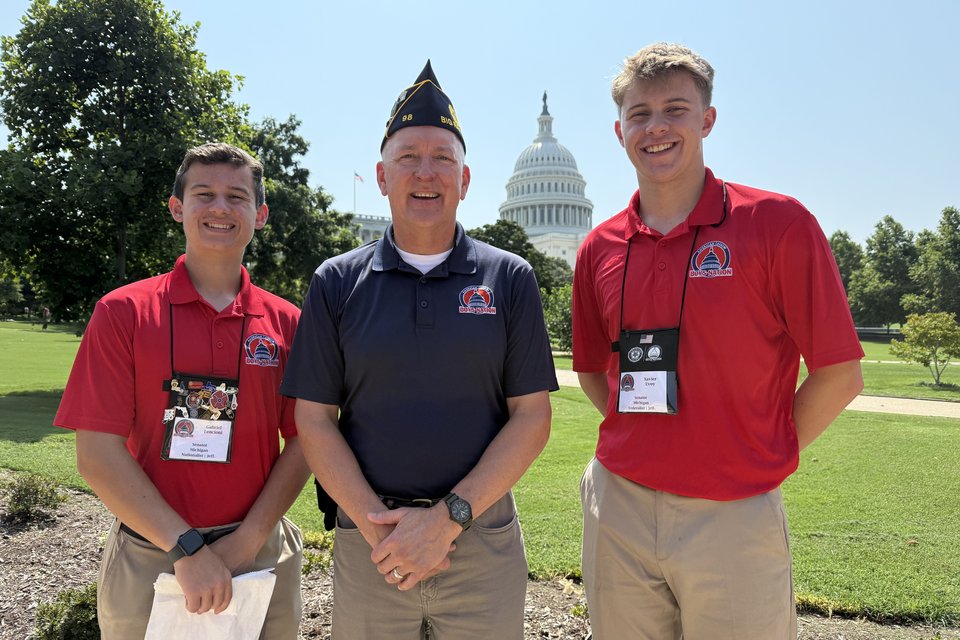Amidst heightened tensions, threats of war in eastern Europe, Ukrainian Christian communities in Metro Detroit project hope, appeal to Mary
SOUTHFIELD — As Russian military forces, more than 83 infantry and armored battalions and growing by the day, assemble along the Russia-Ukraine border, the world holds its breath in anticipation of a potential diplomatic solution to the crisis.
U.S. President Joe Biden, French President Emmanuel Macron and German Chancellor Olaf Scholz are engaging in a series of negotiations with Russian President Vladimir Putin and Ukrainian President Volodymyr Zelensky in efforts to defuse the situation.
But as world leaders map out potential solutions, local Catholic and Orthodox Ukrainian-Americans and supporters gathered Feb. 5 at St. Mary the Protectress Ukrainian Orthodox Cathedral in Southfield to call upon the most powerful weapon in their arsenal — prayer.
The ecumenical service of supplication to the Most Holy Mother of God for Ukraine was an opportunity for the Ukrainian community in Metro Detroit to show a united front of support of their homeland, while calling on local leaders to stand in solidarity with Ukraine.
“We represent our community’s efforts to be ready to step into action should the worst happen to our homeland in eastern Europe,” Mykola Murskyj, chairman of the Ukrainian-American Response Team in Detroit, told the congregation following an evening of prayer. “That doesn’t mean we need to wait for it to happen. There are things we need to do beforehand. We need to make sure we’re organized, prepared, raising awareness — making sure we’re all on the same page, uniting our community to stand with one voice together with Ukraine.”

The vigil was organized by the Ukrainian-American Response Team, a group of Ukrainian-Americans who aim to raise awareness about the situation and to organize relief efforts to those who have been affected since the conflict began in 2014 with the Russian annexation of territory in Crimea.
There are an estimated 46,350 Michigan residents of Ukrainian descent, centered around seven Ukrainian churches, including two Eastern-rite Catholic parishes, St. Josaphat Ukrainian Parish in Warren and Immaculate Conception Parish in Hamtramck; and a Catholic school, Immaculate Conception Ukrainian Catholic grade and middle school in Warren.
“My parish is very closely connected with the people in Ukraine,” Fr. Daniel Schaicoski, OSBM, pastor of Immaculate Conception Parish in Hamtramck, told Detroit Catholic in an interview. “We do fundraisers and collections for the soldiers who are fighting in the east. We even bought uniforms for the soldiers, like winter clothes, medicine — Aspirin, Tylenol, Advil, hygienic things. We buy and send them. Our Sodality of the Blessed Mother group had a bake sale this Christmas, selling pierogi and baked goods, and we’ve been sending the money to the families of soldiers who have died.”
Fr. Schaicoski said the situation on the Russia-Ukraine border is just another development in a series of Russian incursions into Ukraine’s affairs since the 2014 Maidan Revolution, which saw Russia-backed Ukrainian president Viktor Yanukovych ousted from power.
The new government in Kyiv, the Ukrainian capital, wanted to pursue a more Eurocentric policy, steering the country away from Russian influence.

This led to pro-Russia factions in Ukraine’s south and east — backed by in part by Russia — to launch a series of separatist movements that have resulted in the Ukrainian government losing control of the Crimea and Donbos regions of the country.
“My parishioners mostly come from western Ukraine, places like Lvov and Lutsk, areas around Poland,” Fr. Schaicoski said. “But the soldiers fighting in eastern Ukraine are from all over the country, including where my parishioners are from. Their children are terrified for being there. We also have a parishioner who has family in Luhansk, an area taken by the Russians. One of my friends, Fr. Josef (last name not given for fear of reprisal) is from my order, the Order of St. Basil, and has a parish in Crimea, the only Ukrainian Catholic parish run by my order, and that area is now occupied by Russia.”
Back at the Orthodox cathedral, the St. Mary chorus sang hymns to the “Birth-giver of God” during a litany to Mary. Following prayers, office holders and political leaders discussed the need for an American response to the situation in eastern Europe.
“We hear so many of our American brothers and sisters on the Democratic side of the aisle, the Republican side of the aisle, the independents, the libertarians, asking the same question: ‘Why is this our fight?’” asked Rocky Raczkowski, chairman of the Oakland Country Republican Party. “But when you look at the men and women who work at the General Motors plant in Warren or the Ford plant in Sterling Heights, there are Ukrainian parts in those vehicles. When you look at what Putin said about NATO, it’s not just about Ukraine’s freedom, it’s about a free and prosperous Europe.”

Raczkowski discussed how Ukraine, along with Poland and Lithuania, make up the Lublin Triangle, a regional alliance between the three countries — all of which have significant diaspora populations in Metro Detroit and a special connection back home in Michigan.
“Our Michigan National Guard’s main assignment is in Lithuania and Poland, so we can’t let this expansion of Russian ideology stand,” Raczkowski said. “So when Americans, my brothers and sisters of American birth, when we say this isn’t our war, in one respect or another, it is. We must stand strong, united together and demand action from any Republican, Democrat or independent in Washington, to stand together in Ukraine.”
Other delegates at the vigil included Warren Mayor Jim Fouts, Oakland County Executive David Coulter and Southfield Mayor Kenson J. Silver, who spoke of the contributions Ukrainian-Americans have made in southeast Michigan.
U.S. Rep. Andy Levin (D-Bloomfield Township) of Michigan’s ninth congressional district, who serves on the House Foreign Affairs Committee, updated the congregation on the situation in Washington and what needs to be done to defend the sovereignty of Ukraine and ensure peace.
Rep. Levin recounted Ukraine’s history, from its attempts to break away from the Russian Empire following the 1917 February revolution to its transitioning into a democracy after the ousting of Russian-backed President Yanukovych and the 1932 Holodomor Terror Famine, in which between 3.5 million to 7.5 million people died, mostly Ukrainians.
While Russian and Western leaders dispute the cause of the current situation, from the potential expansion of NATO to Ukraine to the presence of Western forces in countries that used to be in the Warsaw pact, Fr. Schaicoski said he, and many Ukrainians, see the current maneuvers by President Putin as just more attempts to project power on Ukraine.

“Russia has a kind of identity crisis without Ukraine,” Fr. Schaicoski said. “Really, Russia is a younger brother to Ukraine. Christianity, civilization came to Kiev well before it came to Moscow. Moscow actually is a branch out from Kiev, from Ukraine. But for Putin, it’s not about Ukraine; he already has his feet wet in Ukraine, in eastern Ukraine and the Crimea. So he’s not looking at Ukraine. He’s looking at Poland, the Baltics, Romania, Moldovia.”
The current geopolitical situation will play out over the coming days, weeks and maybe years, but Fr. Schaicoski is skeptical Russia could fully take over Ukraine, and for that reason, is hopeful for peace.
“If Russia wants to take over Ukraine, they don’t need 100,000 troops; they need a million soldiers,” Fr. Schaicoski said. “Ukrainians are fighters. The Russians have more missiles, more planes, they can take Ukraine out by air, but they’ll never take over Ukraine. The people in Ukraine right now are creating ‘people’s armies’ in every village. So if the Russians cross the main line, they will have to fight these people. Putin knows it won’t be easy, so I don’t think he’s going to invade. We want peace, because we don’t want to hurt the Russians, which is what will happen if they invade.”
Back home, the Ukrainian-American Crisis Response Committee of Michigan is organizing a Stand With Ukraine rally for Sunday, Feb. 20, at the Ukrainian Cultural Center in Warren to raise awareness about the issues surrounding the conflict and the very real consequences at stake.
“As a Ukrainian-American, I’m definitely distraught to see all the changes that are happening in and around Ukraine,” said Dr. Ivanna Murskyj, a parishioner St. Josaphat Ukrainian Parish in Warren and alum of Immaculate Conception School in Warren. “Growing up, we learned about Ukrainian history and culture, and we’re very aware of the atrocities of the past. It’s terrifying to us to see the direction things are going in right now.”

Dr. Murskyj’s grandparents fled Ukraine during World War II and settled in Michigan, a familiar trend for many Ukrainian families in Michigan who still maintain contacts with relatives in the area and frequently go on summer trips to the country.
“The ties are very close, varying by generation, but a lot of members of the Ukrainian community in Metro Detroit were born in Ukraine, and still have close family members who are still living and working in Ukraine,” added Dr. Murskyj, who is a physician at Henry Ford Hospital in Detroit and part of the Ukrainian Medical Association of North America. “Ukraine is a growing democracy, with a very strong-willed, hard-working people that are experiencing aggression from one of our neighbors. It’s absolutely horrendous.”
Detroit Auxiliary Bishop Donald Hanchon was on hand to represent the Archdiocese of Detroit at the ecumenical gathering Feb. 5, reassuring the congregation of Detroit Archbishop Allen H. Vigneron’s support and solidarity with the Ukrainian community.
“We unite as strong friends, brothers and sisters of those who are under pressure,” Bishop Hanchon said. “We pray our prayers, not just tonight but in the days to come, will be a consolation and an empowerment of those sisters and brothers, so far away. I also like to follow the example of Holy Mary, Mother of God, the Protectress of Peace, the Queen of Peace.”

Bishop Hanchon reflected on devotional prayers to Mary, particularly the Memorare, through which people express a confidence in Mary that one’s petitions will be answered.
“With this kind of faith, we can support and pray for the protection of one another,” Bishop Hanchon said. “We pray to God; He earnestly hears us in mercy. He is listening to the hearts and minds of His children gathered tonight.”
While the potential for conflict in Ukraine still remains, in spite of responses from politicians and local organizations, Fr. Schaicoski has one simple request for anyone: pray.
“We ask people to pray for peace, because no war is going to be good,” he said. “No good is coming from a war where innocent people are going to die. But we are creating community here, as Detroit Ukrainians, and in case of war, we’re going to reach out to other communities to help somehow.
"For now, the best thing is to pray for peace. Because we know every prayer is heard.”
Copy Permalink
Ecumenism and interfaith Faithful citizenship












